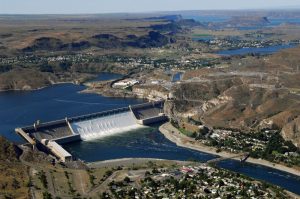
In an effort to support hydropower and fish conservation in the Pacific Northwest, House Republicans from that region introduced a bill last week to extend the Federal Columbia River Power System (FCRPS) Biological Opinion (BiOp) through 2022.
Thirty-one dams in the FCRPS generate nearly 40 percent of the region’s electric power supply. The dams also bring added benefits like flood control, irrigation, navigation, recreation and conservation of various species of fish.
U.S. Reps. Cathy McMorris Rodgers (R-WA), Dan Newhouse (R-WA) and Greg Walden (R-OR) introduced bipartisan legislation that would extend a 2008 BiOp and supplemental BioOps negotiated between the federal government, states and sovereign tribes through 2022.
“Hydropower provides 70 percent of our energy in Washington state — much of which is produced on the Federal Columbia River Power System,” McMorris Rodgers said. “The FCRPS ensures people in Eastern Washington have access to clean, renewable, reliable and affordable energy every single day — all while achieving record fish returns. There is still work to be done, but dams and fish can coexist, and the FCRPS proves that.”
Congressional members from Washington and Oregon voiced concerns about FCRPS management following a court order for injunctive relief to improve salmon returns in March. The order would require more overspill at four dams in the lower Snake River to increase salmon populations, lowering electrical output and increasing costs 2-3 percent.
“Removing the Snake River dams would be harmful to our communities, the environment and our economy,” Newhouse said. “This legislation is needed to support the critical role that Snake River dams play by providing Washington communities with clean, renewable hydropower. In addition, hydropower dams provide many benefits to our region, including flood control, navigation, irrigation and recreation, which is why this legislation is needed to ensure the Federal Columbia River Power System Biological Opinion remains in effect until 2022.”
In a June response to the court order, the Bonneville Power Administration noted $15.28 billion in spending on FCRPS fish recovery and mitigation efforts since 1978, and reports of a dam passage survival rate of 96 to 99 percent for juvenile Chinook salmon and steelhead smolts at the dams in question.
“As we work to improve fish runs, we must not lose sight of the importance to the region of renewable hydropower, recreation and transportation,” Walden said. “The uncertainty created by ongoing litigation over operations impacts all of that. This legislation will provide more certainty that’s needed to help operation of the system to maintain these important benefits to all of the Pacific Northwest.”



